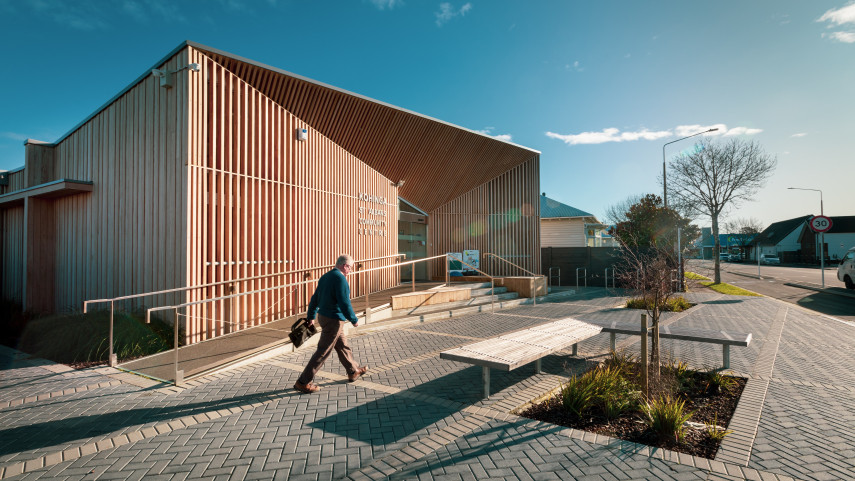The application process and reporting requirements are different for each fund.
Council's community funding is guided by the principals of Te Haumako; Te Whitingia Strengthening Communities Together Strategy.(external link)
This strategy will guide how we work alongside the Third Sector, with funding an important aspect of this support. We recommend you familiarize yourself with the new strategy to help consider how your application will contribute to the pillar objectives.(external link)
Please email communitygrants@ccc.govt.nz for further information.
Te Tangata: People
We actively promote a culture of equity by valuing diversity and fostering inclusion across communities and generations
- Objective 1.1 – Develop and enhance relationships with tangata whenua via mana whenua and Te Hononga.
- Objective 1.2 – Build, nurture and strengthen relationships with Pacific communities.
- Objective 1.3 – Continue to build on the relationships and achievements developed with multi-ethnic and multicultural communities through the Multicultural Strategy- Our future together.
- Objective 1.4 – Harness the strengths of diverse communities and address issues of social exclusion.
- Objective 1.5 – Support groups involved in providing access to arts, culture, heritage, recreation and those who care for the environment.
- Objective 1.6 – Facilitate and promote lifelong learning opportunities for all.
- Objective 1.7 – Work with others to reduce loneliness and social isolation, with a particular focus on intergenerational approaches.
Te Whenua: Place
We support and help build connections between communities and their places and spaces to foster a sense of local identity, shared experience and stewardship.
- Objective 2.1 – Encourage communities to create and sustain a sense of local, identity and ownership.
- Objective 2.2 – Work with new and changing communities in both rural and urban areas to build a sense of belonging.
- Objective 2.3 – Support the community activation and Kaitiakitanga of public places and spaces.
Te Mahi: Participation
Residents and groups in the wider community are socially and actively engaged and are able to initiate, influence and make decisions that affect their lives.
- Objective 3.1 – Empower and equip residents and groups to participate in decisions affecting their communities
- Objective 3.2 – Increase general understanding of Councils decision-making processes and support people to have their say
- Objective 3.3 – Provide well informed support and advice to staff and elected members fir effective decision-making and community engagement
- Objective 3.4 – Increase volunteering opportunities across the Council and the wider community and support the organisations providing such opportunities.
Te Takatū: Preparedness
People feel safe in their communities and neighbourhoods and work together to understand, adapt and thrive in the context of change and disruption.
- Objective 4.1 – Work with communities to prepare for and respond to emergencies, and also increase climate resilience and adaptation action
- Objective 4.2 – Support the capacity of the community and voluntary sector to understand, plan, adapt and respond to risk, disruption and change
- Objective 4.3 – Support neighbourhood and city-wide initiatives aimed at increasing a sense of neighbourliness
We are keen to support organisations that can evidence cultural competency and accessible practices so expanding on how you do this will be beneficial.
In addition, Community Boards(external link) have their own objectives that are used in the prioritisation of local projects.
Please don’t hesitate to contact a Community Development Advisor [PDF, 150 KB] or email communitygrants@ccc.govt.nz for more information should you need.
Applications are invited from eligible not-for-profit groups whose activities provide opportunities in the areas of community, social, recreation, sports, arts, environment or heritage to the wider community or to specifically defined communities of interest.
The following criteria must be met by all applicants:
- A community based not-for-profit community, recreation, sporting, arts, social service, environment or heritage organisation.
- All groups applying for more than $2,000 must be incorporated under the Incorporated Societies Act 1908 or the Charitable Trusts Act 1957 or be a legal entity that is registered for charitable purposes.
- Groups that are not legal entities (informal groups) may apply for up to $2,000 on condition they have a bank account in the name of their group.
- Be based in the Christchurch City Council area with funded programmes or services being provided primarily for Christchurch City Council residents.
- Must have provided accountability reports for all previous Council funding and have no unresolved or outstanding accountability issues including outstanding debt to Council.
- Must have had the funding application approved at a properly convened committee meeting and be able to provide this in writing if requested.
- Must provide evidence of the need for the project.
- Have appropriate financial management, accounting, monitoring and reporting practices.
- Have sound governance and appropriate operational capability and capacity to deliver to the level as agreed.
- Be able to commit to collaboration and partnering, where appropriate.
- Groups receiving Council funding at a citywide level may only apply for local funding if the project is specifically local and no portion of it has been funded at the citywide level.
Further information around the processes for community funding.
Online applications
Our online application forms allow you to save your work and attach your supporting documents as you go. Only fully completed online applications submitted before the closing date will be processed.
We have changed how Strengthening Communities Funds work. If you are unsure, click the decision tree below to work out where you should apply:
Decision tree to help assess which Strengthening Communities Fund to apply to [PDF, 326 KB]
If you are having trouble completing the online form, contact a Community Funding Advisor [PDF, 150 KB] or email communitygrants@ccc.govt.nz.
Confirmation of application
Once you submit your application, a confirmation email will be sent to the main contact person.
This confirmation email will include a unique submission number. If you want to review your submissions at any time, you can do so by logging into SmartyGrants(external link).
If you have not received an email with your submission number, please contact the funding team.
Late applications
Due to the volume of applications, no late applications will be accepted. This is to be fair to all the applicants who apply before the closing date and time.
You must make sure you have submitted your application by the closing date and received a confirmation email back.
Notification of the outcome of your application
- Strengthening Communities Fund: Applications should be notified of the outcome in early September.
- Discretionary Response and Youth Development Fund: Applicants should be notified of the outcome within eight weeks of applying, depending on the timing of meetings.
Grant payments
Once we have received a signed funding agreement, payment will be set up. Please allow a minimum of two weeks for processing of all payments from the time we receive the signed funding agreement.
Grants do not attract GST
Organisations that are GST-registered should be aware that this grant/subsidy is considered 'no deemed supply' from the Council and as such, it does not attract GST.
Changing the purpose of the grant
You are required to spend the grant as per the resolution on the funding agreement.
If you can no longer do this, please explain your situation by contacting a Community Funding Advisor [PDF, 150 KB] or emailing communitygrants@ccc.govt.nz.
Unspent grant money
If you do not spend any of the granted money or you have finished your project and have not spent the entire grant, you will be required to return the unspent money.
To find out how to return the unspent money, please contact a Community Funding Advisor [PDF, 150 KB] or email communitygrants@ccc.govt.nz.
Key documents:
- Community grants terms and conditions [PDF, 35 KB]
Common abbreviations
- SCF: Strengthening Communities Fund
- DRF: Discretionary Response Fund
- YDF: Youth Development Fund
If your question is not answered above, you can contact a Community Funding Advisor [PDF, 150 KB] or email communitygrants@ccc.govt.nz.
If you receive a grant from the Christchurch City Council, you are required to provide reporting. This is a condition of the Community grants terms and conditions [PDF, 35 KB] that you agreed to before receiving a grant.
You are required to spend the grant as per the resolution on the funding agreement. Any variation to this, not previously agreed to by the Christchurch City Council, will mean you will have to return the money.
The same applies if you have finished your project and have not spent all of the grants, you will be required to return the unspent money.
Future funding can be withheld if reporting requirements are not met.
Reporting requirements
Reporting is required on an annual basis or when the grant has been fully expended.
To report on your grant go to the SmartyGrants system(external link). After logging in, click the My Submissions button to see your applications in the system. Find the relevant application and complete the attached End of Project Accountability Form. If either your application or the accountability form is not there, please call 03 941 5488 or email communitygrants@ccc.govt.nz.
Below is a description of citywide and local board applications. Use the decision tree to help you decide which fund to apply to: Decision tree with links to apply to the Strengthening Communities Fund. [PDF, 326 KB]
Citywide
Projects that meet the following threshold are deemed to be citywide projects and can only be assessed at the citywide level:
- Projects, initiatives, programmes or services expressly targeted at residents from four or more city-based community board areas.
Local
The following threshold applies for projects that can be considered under local community board funding:
- Projects, initiatives, programmes or services expressly targeted at residents from a maximum of three city-based community board areas.
Notes
- This definition looks to the purpose and scope of the application. It does not seek to determine whether a group (through its name, purpose or undertakings) is a citywide group or organisation. It looks solely at the targeted area where direct benefit and service delivery are provided.
- Groups who by their fundamental nature are citywide providers, such as umbrella organisations, are able to have projects considered at the local level if they fall within the definitions and they are not in receipt of any concurrent funding from the Council that already funds the local services covered in the local application.
The following outlines information on the priorities and outcomes of the allocation of Christchurch City Council funds.
Priorities
The following priorities are used in allocating funding:
- Older adults
- Children and youth
- People with disabilities
- Ethnic and culturally diverse groups
- Disadvantage and / or social exclusion
- The capacity of community organisations
- Civic engagement.
These priorities were developed from the key challenges to Building Strong Communities identified in the 2009-19 LTCCP.
Outcomes
The Council is not able to meet the needs and expectations of all not-for-profit and voluntary groups. Therefore, it focuses assistance on key activities and initiatives that contribute to and align with the community outcomes in the Long-Term Council Community Plan (LTCCP) and with other Council strategies.
The following funding outcomes are used to evaluate and assess applications:
- Support, develop and promote the capacity and sustainability of community, recreation, sports, arts, heritage and environment groups
- Increase participation in and awareness of community, recreation, sports, arts, heritage and environment groups, programmes and local events
- Increase community engagement in local decision making
- Enhance community and neighbourhood safety
- Provide community based programmes which enhance basic life skills
- Reduce or overcome barriers to participation
- Foster collaborative responses to areas of need.
The Strengthening Communities Strategy is a framework to guide the Council's work with community organisations, which in turn work in a range of ways to help develop strong communities. Strong communities give people a sense of belonging and encourage them to take part in social, cultural, economic and political life.
For the Strategy to promote the well-being of people in Christchurch, it needs to understand ongoing and emerging issues. As a starting point to help deliver on the Strategy, Council has undertaken a brief literature review to identify and understand community trends and issues.
- Community Research Project - Executive summary 2008 [PDF, 162 KB]
- Community Research Project - Full report 2008 [PDF, 740 KB]
In addition, Community Boards have their own objectives that are used in the prioritisation of local projects.
Successful applicants may wish to display the Christchurch City Council Logo on materials relating to their successful funding request.
If you wish to acknowledge Christchurch City Council’s support, please refer to the logo guidelines [PDF, 822 KB].
Resources
- White Council logo [PNG, 96 KB]
- Black Council logo [PNG, 43 KB]
Related news

Ōtākaro Avon River Corridor shines, grows since quake
In the wake of the 15th anniversary of the 22 February earthquakes, we’re taking a look at different Council aspects of the rebuild, and how far we’ve come. Next up, the residential red zone's Ōtākaro Avon River Corridor (OARC).
26 Feb 2026
Rebuilding our communities
Following the 15th anniversary of the 22 February earthquake, we’re looking at different Council aspects of the rebuild, and how far we’ve come. Next up, community hubs and housing facilities.
25 Feb 2026
End of an era for the Libraries art collection
Christchurch City Libraries’ historic lending Art Collection has come full circle, with pieces making one final move to the Art Gallery’s collection.
19 Feb 2026